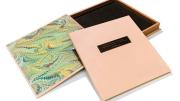Artist Francie Randolph ’87, Ed.M. ’96, of Truro, Massachusetts, was looking for a visual element that could unite the ideas of failure and imagination. She was designing a limited edition of 15 hand-bound books, enclosed in wooden boxes, each a reprint of Harry Potter author J.K. Rowling’s 2008 address on Commencement afternoon, “The Fringe Benefits of Failure, and the Importance of Imagination.”
When Randolph’s son came home from school one day and displayed his own name written in Braille, she had a eureka moment. She learned the story of Louis Braille, a French child who lost his sight in 1812 at the age of three after an accident in his father’s harness shop, but by the age of 15 had invented the six-dot Braille system for rendering letters and words in tactile form--an alphabet now used worldwide by blind and severely sight-impaired individuals to read.
“The creation of this book was wonderful for me,” Randolph explains, “because practicing and creating Braille for hours in my studio led to thinking about the nature of feeling--reading Braille, versus analyzing--sight reading. I found that this balance between intuitive feeling and conscious analysis is at the heart of Rowling’s speech when she says, ‘We do not need magic to change the world, we carry all the power we need inside ourselves already: we have the power to imagine better.’”
Georgene Herschbach, the former registrar of Harvard College and co-master (with her husband, Dudley Herschbach, Baird professor of science emeritus) of Currier House, commissioned the limited edition as a source of gifts for friends. She knew Randolph from having worked with her on the covers of Harvard’s course catalogs, which Randolph designed from 1993 until 2009, when they went online.
So far, Randolph has made eight of the 15 books; recipients include President Drew Faust and dean of Harvard College Evelynn Hammonds. Rowling is also on the gift list. A copy will be displayed at Randolph’s annual studio exhibition on Thursday, August 12 (see www.francierandolph.com).
Randolph hand-embossed a single word in Braille in the margin of each page of the text. A vellum overlay at the end of the book provides the key. The Braille words spell out a sentence from Plutarch that Rowling quoted in her speech: “What we achieve inwardly will change outer reality.”










